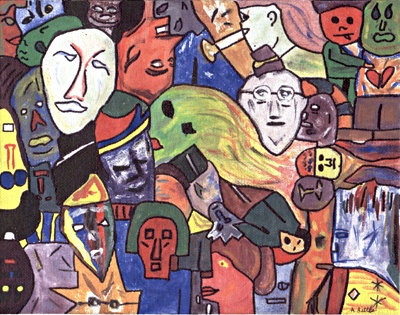All Nonfiction
- Bullying
- Books
- Academic
- Author Interviews
- Celebrity interviews
- College Articles
- College Essays
- Educator of the Year
- Heroes
- Interviews
- Memoir
- Personal Experience
- Sports
- Travel & Culture
All Opinions
- Bullying
- Current Events / Politics
- Discrimination
- Drugs / Alcohol / Smoking
- Entertainment / Celebrities
- Environment
- Love / Relationships
- Movies / Music / TV
- Pop Culture / Trends
- School / College
- Social Issues / Civics
- Spirituality / Religion
- Sports / Hobbies
All Hot Topics
- Bullying
- Community Service
- Environment
- Health
- Letters to the Editor
- Pride & Prejudice
- What Matters
- Back
Summer Guide
- Program Links
- Program Reviews
- Back
College Guide
- College Links
- College Reviews
- College Essays
- College Articles
- Back
Culture Shock at Home
My parents and I stand, shivering, at the curb. We’re waiting for our ride. Behind me I can hear a couple arguing, “…always late. We should’ve called a cab.” “Never mind, it’s not that cold.” “Not that cold?!” “It’s the airline’s fault. I told you before…” I feel like I’m intruding but I can’t help listening in; English still sounds so foreign, so strange. Our ride pulls up, a shiny blue minivan. I haul my bag into the back and clamber in; it still smells new. I look out the window. Everything is dull, brown, lifeless. Tall grey buildings surrounded by withered grass; a Texas winter. The driver reminds me to fasten my seat belt. The road is smooth and we whizz along at a phenomenal speed. I press a button on the door and the window slides obediently downward. Cold air rushes in, biting my face; I quickly close it again. When we reach our new home I begin to explore. In the kitchen I turn on the water and smile; it’s hot. I flick the switch by the door; the light comes on and I laugh. If anyone was watching they’d think I was crazy! Then I grow serious. I walk to the front door and look outside, everything seems so empty. I sit down there on the floor and close my eyes. I imagine I’m far away…
Dust bellows out from under the wheels of our jeep as it bounces along the dried river bed that is the road in front of our home. Sitting on the floor of the cargo area I feel rather like I’m on a small boat in a storm. My friends sit around me, everyone talking, laughing, all at once. I lean out the window and look up at the bright blue of the Caribbean sky. In front of us are the Cordillera Central, tallest mountains in all the West Indies, topped with wisps of snow. The jeep lurches to a stop and we all tumble over each other as a scrawny dog races across the street; escaping, no doubt, from some band of street boys with sticks, shoe-shine boys they’re called. We enter the city and encounter a traffic jam. The cities electricity is on. The traffic light is working. People are confused. This isn’t normal. Our driver casually turns and drives over the median, there isn’t much traffic going the other way, to circumnavigate the traffic jam. We finally reach our destination, the Haitian market. Haitians come here to sell clothing and other assorted goods that have been donated to them but which they have no use for, the money from these sales usually goes to support their families back in Haiti. Women wearing brightly colored dresses walk about with baskets, piled precariously high with clothes, balanced on their heads. People shout out their wares and men barter, gesturing wildly, flinging their hands in every direction. A wrinkled old man leans in the window offering sweet smelling fruits of all kinds. This is my home. This is where I belonged.
You may think I’m crazy, but let me explain. This tropical land is not some figment of an overactive imagination but simply a memory. For two years my family lived in the Dominican Republic, a country in the Caribbean that shares the island of Hispañola with Haiti. My parents are both pastors and we came to help run a mission center there. Those two years helping others in need were the best of my life so far.
But now ‘Rupublica Dominicana’ is simply a slowly dimming memory, something to write about, to look back on with fondness (and perhaps some rose colored glasses). When I returned to the United States after those two years, my two first years of high school, I felt confused, alone. My initial re-fascination with all things modern quickly wore off and I became aggravated by the prevalent wastefulness and seemingly callous nature of the American people. Those I encountered seemed cold, standoffish, even cruel, when compared to the warmth of the Latin culture I had grown familiar with. I was experiencing culture shock within what should have been my own culture. I had not expected and had not been prepared for anything like this. Everyone said they were so happy I was home but if home is where the heart is then my home was 2,000 miles away.
It’s been two years now since my family returned to the U.S.A. and I think, besides the strange looks I get no and then when I say things like “Un chin.”(A little bit) and “Mañana, mañana”(Tomorrow, tomorrow; later), that I have adjusted to ‘Western’ life fairly well. But I don’t think I will ever be able to call Texas my ‘home’. My heart will always be with the bustling markets, the barefooted children, the barking dogs, the pothole infested roads, and the warm, smiling, people of the Dominican Republic.

Similar Articles
JOIN THE DISCUSSION
This article has 0 comments.
